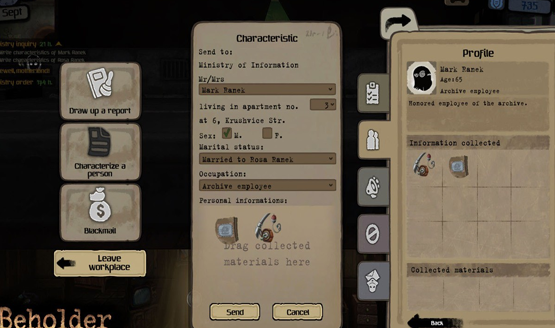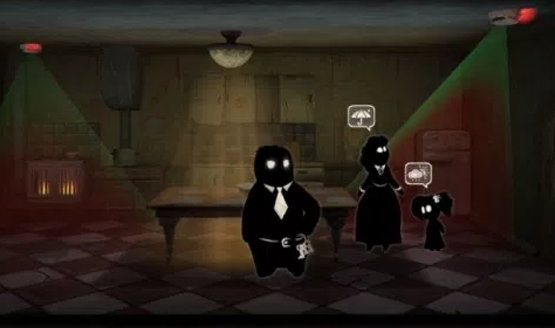Keys in hand, I walked into my brand new job. Or rather, I was led in by some very shady looking government officials. I was the apartment manager for a building in the middle of on oppressive surveillance State. I had been installed here by the Ministry to keep an eye on the residents and report the comings and goings of those living in the complex. Succeed, and I would ruin a lot of other people’s live while ensuring a better future for myself and my family. Fail, however, and this delicately balanced modicum of success I was seeing in the oppressive State (read: being alive) would all come crashing down. I would be killed, and my family would soon follow.
Beholder: Complete Edition is the console release of a title that originally launched on PC back in 2016, and then came to iOS in 2017. It includes the Blissful Sleep DLC that came out on the PC in 2017 as well, which is a separate campaign that should be played upon completion of the main game. The main task is to manage an apartment complex. Installed by the State, I would be required to watch the residents, report on their actions, and sometimes take action of my own at the behest of a single phone call, all in addition to managing relationships with the people living there and maintaining the needs of my family. It’s a management sim with a twist. Yet the game can’t quite manage itself.
Beholder never really manages the management sim aspects very well. Instead of having a budget of expenses versus a reliable income, with deviations expanding on that base, there are oddities that are never clearly explained like two separate currencies, Carl’s wife periodically asking for money for utilities, and income generation from profiling the tenants of the apartment building. Beholder fails to lay down the ground rules of the game world well enough for me to ever have felt comfortable taking risks, and if I did take risks, I did so in an uneducated way. Given that the game’s entire premise relies on asking me whether I want to follow totalitarian surveillance state orders or not, I wished that I had a more solid foundation of understanding to build on. It’s hard to enjoy a management sim when it feels like I’m missing half of the tools needed to effectively manage, including any kind of emotional connection to the decisions being made.
Evict Him Again, Sam
Management sims are meant to be replayed, or at least that’s the impression Beholder gives off, but the repetition really makes replaying things rather tedious. Where the choices I made could change some things up, the tasks to complete, government edicts, and general order of events was the same each and every time. I can’t tell you how sick I am of getting the order to evict Carl Schimmer. The Government Elite difficulty seems almost impossibly hard to cope with, and despite repeated attempts, I couldn’t ever pass muster. I always quickly found myself short on cash I needed for this, that, or something else, and would lose the game because I was a couple hundred dollars short on utilities whenever that would come up. On the other side, Trainee was far too generous. It could use a difficulty right in between, offering a more fair, but fun challenge.
Beholder offers a seed, but never blooms. It’s the same rooms, the same families, the same problems. I could make varying decisions on how to handle situations, but it never changed the “spy, profile, tough choice” gameplay loop, and the characters were never interesting enough that I actually cared. Despite a small tutorial, Beholder throws players in the deep end, and while I learned more and more each time I played, I quickly grew bored of playing and replaying. There’s almost a rogue-like aspect, because failing and restarting doesn’t offer any enhancements except the knowledge of my last failure, but by the time I felt like I had acquired enough knowledge to effectively manage the apartment and not get poor Carl and his family murdered by the state, I was done.
All that said, when Beholder works, it works, and it works well. Having moments when I was juggling a bunch of plates was exciting. Most of the missions are timed in some way, so it adds a stressful tension. In addition to managing the apartment and orders of an oppressive government, there’s also Carl’s family to worry about. They pestered me for a variety of needs, and it was often taking care of (or not taking care of) them that got me into the most trouble. The ultimate win-state for the game is to get Carl and his family through to the end alive, but that’s a tough quandary to crack. Often it will involve making sacrifices elsewhere. Not everyone gets to have a happily ever after.
Web of Fates
Beholder works best when it’s intertwining the stories of the many residents of the apartment complex. Sometimes the decisions aren’t as simple as whether to follow Ministry orders or help my tenants. Often times the fate of one person was tied into whether I helped or harmed another person. Things can be quite simple, but often the ideal outcomes required gymnastics of working with (or against) multiple people and thinking three steps ahead at all times. Getting caught up in the web is an easy way to ensure that you fail, and this tangle of interactions is Beholder’s highlight, but the tedium of getting to this moments far outweighs the intrigue they bring.
The idea of a voyeuristic building management sim is an exciting premise, but the unclear foundation it starts on does the repetition of tasks no favors in managing risk versus reward. Simply put, Beholder never made me care about the outcomes of any particular decision. Instead of having an emotional investment—caring for my family, my tenants, and the demands of the State were simply chores—they were tasks on a list. The game never made me care about finding $20,000 to heal my sick daughter, or making the choice between evicting or helping the family in apartment 1.
Beholder’s problems are exacerbated by taking a game that was clearly built for PC (and then iOS) and trying to give it a console makeover. Spying on neighbors and managing a full apartment building seems like it would be much easier with either a mouse and keyboard or a touch screen. Using a controller to play it never felt quite as natural as I would have liked, even if they did a fair job at translating the mechanics for consoles. The core of the game is built with PC in mind, and that ends up being a distraction in the console version.
Beholder is an interesting management sim with brilliant morally ambiguous themes taking center stage, however it suffers from imbalanced execution. There’s far too much of an uphill climb to finally understand and begin to enjoy Beholder. Once I got to the point that I felt like Beholder was finally enjoyable because I understood it (and had gotten a handle on the controls), I was tired of playing it and really didn’t want to start yet another run of tedious voyeur apartment management. With no real randomization of tenants or tasks, asking for repeated play is asking players to get tired of doing the same things over again. It’s moral quandaries never quite hit the emotional notes they are reaching for, leaving Beholder as nothing more than a massive list of chores that bore long before they entertain.
Beholder Complete Edition review code provided by publisher. Version 1.00 reviewed on Standard PS4. For more information on scoring, please read our Review Policy.
-
Eventually becomes enjoyable...
-
Web of interconnected tenant stories
-
Some frantic parts of voyeuristic building management are exciting
-
...after the game gets boring
-
Tedious list of repetitive chores
-
Emotional connection to care about decisions is lacking
-
Poor foundation fails to explain rules of the world











